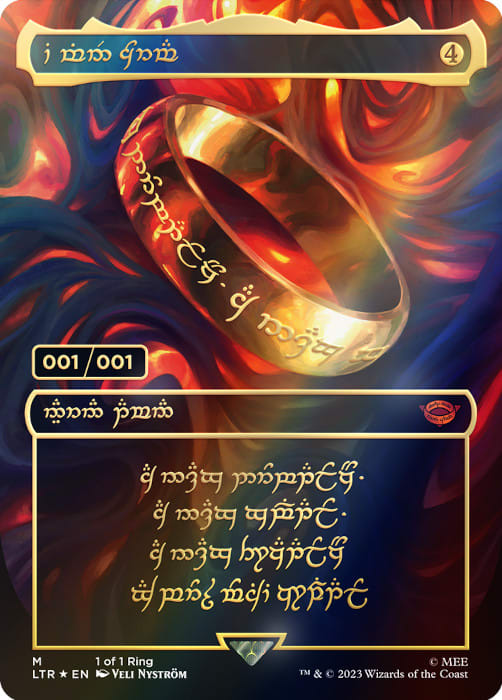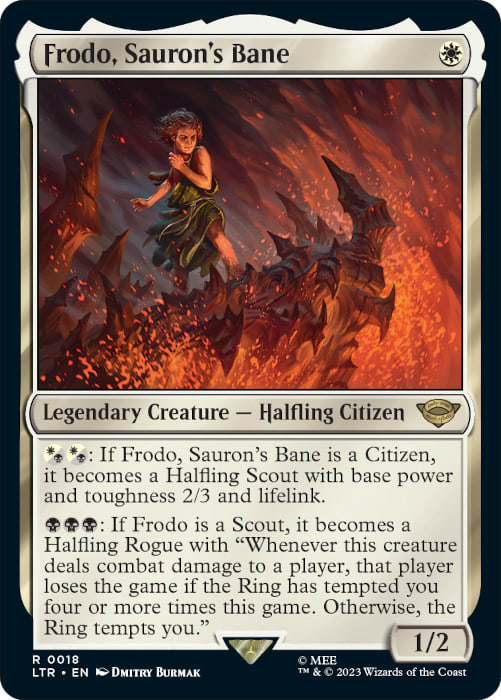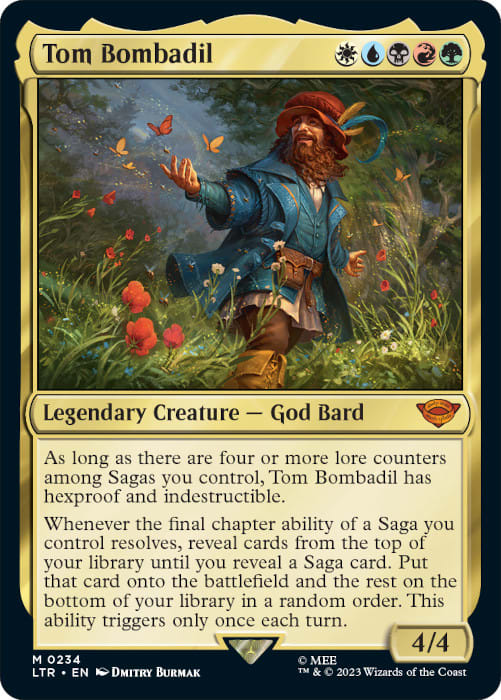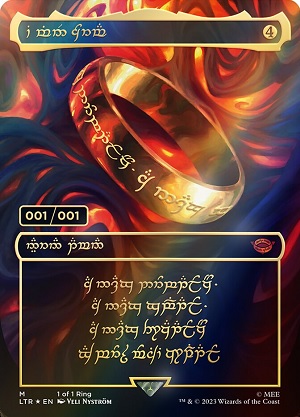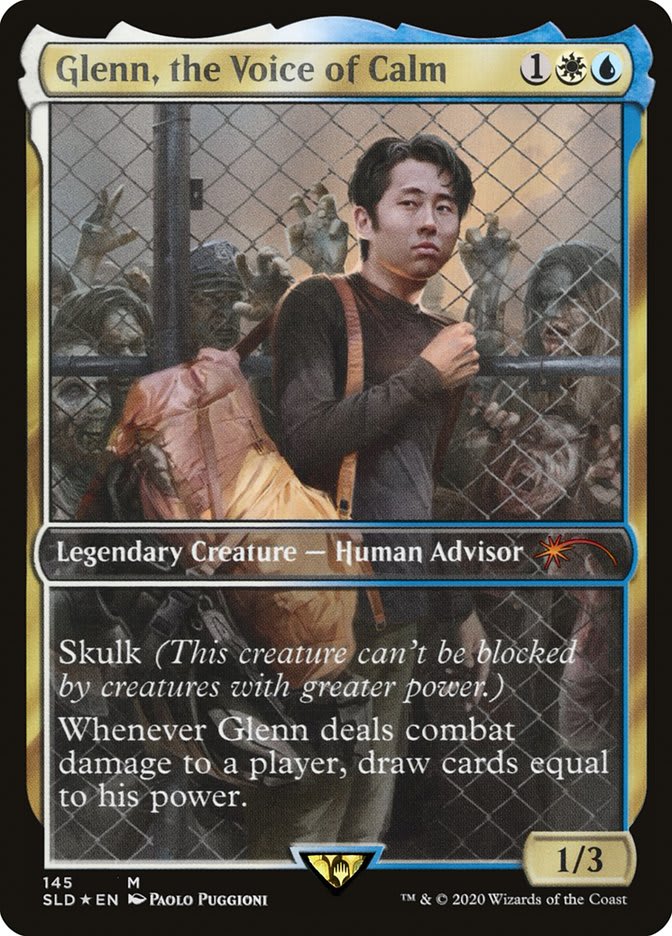The Lord of the Rings is the great granddaddy of them all, an absolutely legendary IP that almost all fantasy stories and games can trace back to in one way or another. Every surly dwarf or wizened wizard that has appeared in games or D&D campaigns owes something back to JRR Tolkien and his incredible world he created in one way or another.
That's why it's so exciting to see Tales of Middle-Earth, the new Universes Beyond crossover set as a fan of both Magic: The Gathering and The Lord of the Rings. We will get to see cards for Frodo, Sam, Aragorn, Gandalf and more, as well as getting to see Magic's take on the entire world of Middle-Earth. This crossover is also based on the books rather than the movies, which means that characters like Tom Bombadill are in play, as well as the creative team having more freedom to imagine the world as they see fit.
That's all well and good, and I'm sure we'll spend a lot of time talking about the set over the next few months up to and after its release, but today I want to talk about one thing.
Or perhaps, one ring?
Seriously, there's only one of these!
Wizards of the Coast has experimented with serialized cards (individually numbered and unique) before, most notably on the Retro Frame sheet from The Brother's War, but of course the cards are usually one out of a hundred or some other smallish number. These have been very popular with collectors, with numbers that have special significance like 1/500 or 420/500 fetching a premium, further tapping into the "unique collectables" market.
However, The One Ring here is something else entirely.
The serialization on this card is essentially irrelevant, as the point of a serial number is to classify and catalog something as one of a set of things. There is no set here, just something that's a lot more like a Golden Ticket than a Magic card.
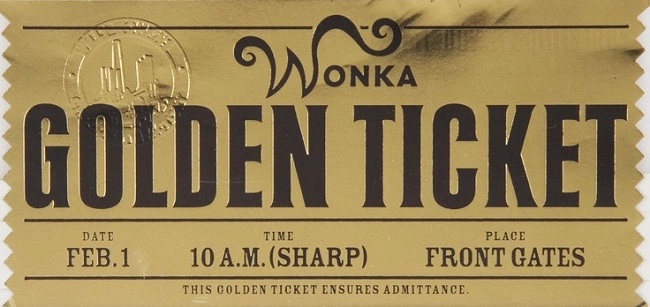
Make no mistake, if you open the 1/1 The One Ring in a collector booster, you've essentially won the lottery. There's been a lot of discussion since the announcement about what the value of this card is going to be, so I'll be happy to lay it out for you:
This is going to be the first Magic card to ever be worth seven figures.
Officially, the most expensive Magic card ever sold (as far as I am aware) is a PSA graded perfect 10 Alpha Black Lotus, which sold on Ebay a few years back for a little over $500,000.
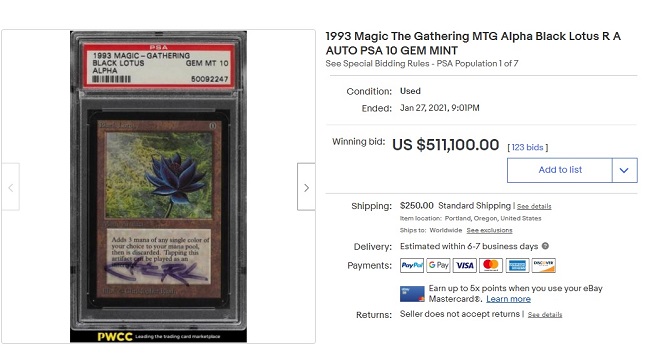
There's hearsay that Post Malone bought a signed artist proof of Black Lotus for $800,000, as well as more rare single Magic: The Gathering items that are unique and were never in an official set, but this is basically what we have as the ceiling for what a Magic card can be worth.
The word on the street is that there are seven PSA graded perfect 10 copies of Black Lotus in the world right now, which is still a lot more than one. The one 1/1 The One Ring is, like the precious object it represents from Tolkien's famous book, literally one of a kind. This item exists at the perfect intersection between two insanely popular and collectible IPs in a crossover product that looks like it is going to be extremely popular. The fanfare is there, everyone is talking about it, and you better believe that once this thing is found that it's going to be a frenzy for all the rich collectors out there.
The uniqueness here is very important; there's always a chance that another PSA 10 Black Lotus hits the market at some point, or some other big rare collectable comes along, but with the one 1/1 The One Ring, this will never happen. One person is going to own this card, and it will not be available again unless they decide they want to sell it.
Does your average Magic player have a chance at owning this? Extremely unlikely, when you think about high profile wealthy Magic players like Post Malone, Hunter Pence, Cassius Marsh, and so on. All it takes is a few of them to show interest to create a bidding war and then it is on. However, the important factor is when someone who is actually stupid rich takes interest. We're talking some tech CEO or other high-end billionaire with money to burn. Both Magic: The Gathering and The Lord of the Rings are properties with large followings and huge nerd cred, so it's not exactly a leap that this is something a rich tech CEO would be interested in. And if that happens? The sky is the limit.
So, the question is...
Is This a Good or Bad Thing?
Magic has been pushing harder and harder into the collectable space in the last few years, making this feel like a big-time continuation on that path. Is Wizards of the Coast milking the game for all it is worth, or are these kinds of products good for the game?
The reality is that, despite people's (warranted) complaints about capitalism, greed, and money for shareholders, we want Wizards of the Coast to make money. Success for Wizards of the Coast means success for Magic, which means that Magic gets to continue and thrive. This does not excuse greedy or shady practices, but on the whole Magic players should want Wizards of the Coast to succeed.
Having this sort of clear separation between "collectable" and "game piece" is an important distinction - This version of The One Ring is not needed for anything as far as gameplay goes. The normal version found in booster packs does the exact same thing, and you could even argue is more desirable from a gameplay perspective because, you know, you can actually read it. As such, it doesn't hurt the game of Magic that these sorts of collectables exist, because if it doesn't interest you then you can opt out, and if you're lucky enough to open one then cool, you can sell it and buy many versions of the plain game piece.
This is a large part of why The Walking Dead Secret Lair created such an outcry. The Secret Lair series is meant to be a collectable product, a bonus for people who enjoy collectables, but because the cards were mechanically unique, they were gatekeeping the game pieces behind this collectable paywall, which crosses the line.
As such, the increase in collectable products is good for the game as a whole, as long as the line is clearly drawn between "collectable" and "game piece." Furthermore, these sorts of collectables in booster packs tend to drive down the overall price of the regular cards, which is good because it makes the base level of the game cheaper and more accessible without costing Wizards of the Coast their profits.
The Issues
That's not to say that there aren't issues here.
If Wizards of the Coast is not crossing the collectable/game piece line, but also not making moves to try and make the base level game of Magic affordable (ie. no $80 Ragavans and $75 Sheoldreds), then a lot of these benefits fall on deaf ears. This is even more of an issue if they aren't reinvesting into their game through Organized Play or making MTG Arena the best program it can be with new features and polish (remember animations?). Making lots of money on the collectable side is fine, but there comes with it a responsibility to reinvest in the core parts of the actual game the collectable is based on.
There are also issues with the loot box system in general, which this sort of lottery ticket takes to an extreme. While Wizards of the Coast ignores the secondary market and does not ascribe any sort of value to its collectables, if The One Ring ends up being a million dollar Magic card, one has to wonder if some sort of lottery regulation would need to be put in place with such an large established prize being in packs.
There are also some perverse incentives at play here too.
This card is a big deal for Wizards of the Coast. Everybody is talking about it, as it will probably drive a bunch of sales and discussion about The Lord of the Rings collector boosters bigtime... until the one 1/1 The One Ring is finally opened. At this point the perceived value of a Lord of the Rings collector booster is going to take a big hit. As such, Wizards of the Coast really wants this thing to be opened later rather than sooner.
However, they also want it to be opened, preferably publicly! The worst-case scenario of some mom buying this for their kid at Walmart, the kid opening it, not understanding what it is, and it getting lost at the bottom of the toybox (cue "and some things that should not have been forgotten were lost") is not that outlandish. Slightly less worse than that is someone outside the social media sphere opening it and either not realizing its worth, or just selling it privately without any fanfare.
Both of these issues create strong incentives for Wizards of the Coast to try to at least somewhat manipulate the distribution of this card, but at the same time doing so would potentially ruin any sort of future release like this as well as strongly damage consumer confidence.
Would this happen? Probably not, but as long as they are doing promotions like this it is going to be a concern.
All In All?
All in all, I think this is a slam dunk promotion from Wizards of the Coast, and this comes from someone who is a player first and has close to zero interest in the collectable aspect of the game at all.
This is going to drive tons of excitement and conversations about Tales of Middle-Earth, even from people like myself who have zero interest in purchasing a collector booster. And the best part is that it's completely additive; If this isn't something that interests you, great! Keep playing Magic how you've been playing it. But if it does interest you, it's a big winner.
So good luck to you all in your quest for the one ring! That is of course, unless Mr. Beast decides to offer two million dollars for it to record a YouTube video of him dropping it in a volcano or something.
















